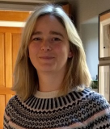Meritxell Canals and Davide Calebiro have a joint vision of studying membrane receptors using revolutionary quantitative imaging approaches and identifying and developing novel drug treatments for chronic diseases.

Meritxell Canals
Meri Canals did her PhD in Biochemistry at the University of Barcelona, Spain and at Karolinska Institute in Sweden. Her PhD was part of an EU-funded multidisciplinary project that examined the interactions between adenosine and dopamine receptors in Parkinson’s Disease. During Meri's PhD, she obtained scholarships to visit the laboratories of Prof M Bouvier (pioneer in the application of BRET to GPCRs; Montreal, Canada) and Prof R Pepperkok (a leader in the development of FRET; EMBL, Germany). She completed postdoctoral training in a series of leading GPCR pharmacology groups. In the laboratory of Prof G Milligan in Glasgow, (2005-2008) her research focused on the functional consequences of GPCR co-expression and oligomerisation for which she developed novel RET techniques. As a senior post-doctoral fellow in the laboratory of Profs R Leurs and M Smit in Amsterdam (2008-2010) her research focused on the regulation, pharmacology and medicinal chemistry of chemokine receptors.
In 2010, Meri was awarded a Monash Fellowship to start her independent line of research within the Drug Discovery Biology Theme at the Monash Institute of Pharmaceutical Sciences in Melbourne, Australia. In 2017, Meri took a sabbatical year to work with her collaborators at the departments of surgery and pharmacology of Columbia University, New York. In October 2018, she moved to the University of Nottingham, to join the Centre of Membrane Protein and Receptors, (COMPARE) as Professor of Cellular Pharmacology at the School of Life Sciences.
Meri's research interests focus on understanding the interactions between G Protein-Coupled Receptors (GPCRs) and intracellular proteins, and their consequences for receptor signalling and trafficking. In recent years her research has been focused on the study of receptors involved in pain transmission and modulation. In particular, work in Meri's laboratory is focused on understanding the molecular and cellular mechanisms by which opioid drugs elicit their physiological effects to guide the development of better and safer avenues for pain treatment.
View Meri's full profile

Davide Calebiro
Davide Calebiro is a Professor of Molecular Endocrinology and Wellcome Trust Senior Research Fellow at the Institute of Metabolism and Systems Research (IMSR) of the Univeristy of Birmingham and Co-Director of the Centre of Membrane Proteins and Receptors (COMPARE) of the Universities of Birmingham and Nottingham.
He leads a multidisciplinary research team comprising biologists, chemists, physicists, engineers and computer scientists focusing on the basic mechanisms of G protein-coupled receptor (GPCR) signalling and their alterations in endocrine, metabolic and cardiovascular diseases. To study GPCR signalling in cells and tissues, they develop and use innovative optical methods based on FRET and single-molecule microscopy, which allow them to directly observe signalling events in living cells with unprecedented spatiotemporal resolution.
His major scientific contributions include the discovery that GPCRs are not only active at the plasma membrane but also at intracellular sites and that these receptors interact among themselves and with other membrane proteins to form dynamic nanodomains at the plasma membrane.
Davide’s work has been published in prestigious scientific journals such as Nature, New England Journal of Medicine, Journal of Clinical Investigation, PLoS Biology, PNAS, Nature Communications and Science Advances, attracting several prizes and awards. He is serving on multiple panels and committees, including the Programme Committee of the Society for Endocrinology and the MRC Molecular & Cellular Medicine Board.

Laura Kilpatrick
Laura undertook a BSc in Biology from the University of York in 2005 specialising in Molecular Cell Biology and Immunology. In 2007, she completed an MSc in Cancer Immunotherapy at the University of Nottingham, investigating the underlying molecular mechanisms of cancer development and the identification of novel tumor targets. In October 2012, she was awarded an AJ Clark studentship from the British Pharmacological Society to undertake doctoral studies at the Cell Signalling Research Group (CSRG) at the University of Nottingham in the School of Life Sciences. The primary aim of her PhD was to use bimolecular fluorescence complementation (BiFC) to constrain G protein coupled receptors (GPCRs) as precise complexes, in order to probe the functional consequences of dimerisation. She was awarded her PhD in November 2014 and immediately took up a postdoctoral position at the CSRG funded by a BBSRC Link Grant with Promega Corporation to use bioluminescence resonance energy transfer (BRET) in conjunction with advanced imaging techniques to quantify the molecular pharmacology of a key anti cancer therapeutic target - the Vascular Endothelial Growth Factor Receptor 2 (VEGFR2).
In January 2020 she was awarded an Anne McLaren Research Fellowship funded by the University of Nottingham allowing her to establish her own independent research career. In June 2023, she transitioned to an Assistant Professor position in the School of Pharmacy. Her current research interests involve using assays that investigate protein-protein interactions (eg. BRET, BioID) in conjunction with CRISPR/Cas9 and advanced fluorescence imaging techniques (eg. super resolution microscopy and fluorescence correlation spectroscopy), to characterise the molecular pharmacology of receptor tyrosine kinase and GPCR family members. She is particularly interested in potential molecular interactions between RTKs and other membrane proteins such as GPCRs or neuropilin-1, and whether such complexes may represent novel pharmacological entities for the treatment of cancer and cardiovascular diseases.

Dylan Owen
Dylan Owen completed a Physics degree in 2004, MRes in Protein and Membrane Chemical Biology in 2005 and PhD in Biomedical Optics in 2008, all at Imperial Collage London. His PhD involved the development of fluorescence lifetime imaging (FLIM) instrumentation and their application to study membrane lipid microdomains in T cells. After his PhD, Dylan undertook a postdoctoral position in the lab of Katharina Gaus at the Centre for Vascular Research and later the Australian Centre for Nanomedicine, University of New South Wales, Sydney, Australia. There, he was awarded a Fellowship from the Australian Research Council (ARC) to use fluorescence correlation spectroscopy to analyse the dynamics of receptors at the T cell immunological synapse. He also started working with one of the first commercial single-molecule localisaton microscopy (SMLM) systems, providing developmental testing and developing the first quantitative statistical analysis to quantify protein clustering from these systems. These were used to analyse the distributions of kinases and adaptor proteins at the T cell synapse.
In 2012, Dylan accepted a lectureship position at King’s College London jointly between the Department of Physics and the Randall Division of Biophysics, starting in 2013. He was awarded a Marie-Curie Career Integration Grant in 2013 and an ERC Starter Grant in 2014 to develop advanced fluorescence imaging methodology and apply them to study the organization of signalling molecules in T cells. Notable developments from this project include the development of model-based, Bayesian cluster analysis, SMLM-based actin fiber analysis and the discovery that mutations in the PTPN22 phosphatase that predispose for autoimmune disease cause aberrant nanoscale organization. In 2018 He was awarded a BBSRC grant to continue the development of analysis methodology for SMLM, including the first applications of machine learning techniques. During his time at King’s College, Dylan lectured 3rd and 4th year undergraduate modules in Biophysics, acted as head of Research for the Physics Department and co-founded the London Super-Resolution meeting series. He was promoted to Senior Lecturer in 2016 and Reader in 2018.
In 2019, Dylan moved to the University of Birmingham, taking up an Interdisciplinary Chair between the Institute of Immunology and Immunotherapy and the School of Mathematics, as well as membership of COMPARE. Dylan’s lab continues to develop new microscopy methods – especially in super-resolution image analysis and apply them to understand the biophysics of cell membranes and the role of nanoscale organization in regulating T cell function. He was appointed Deputy-Director (Birmingham) of COMPARE in 2021. Dylan leads 2 modules on image analysis and modelling for the Birmingham MSc in Bioimaging and leads the Cell and Molecular Biology foundation module for the Birmingham International Academy.

Joëlle Goulding - Senior Research Fellow in Advanced Microscopy,
University of Nottingham
In April 2017, Joëlle Goulding was appointed as Research Fellow in Advanced Microscopy for COMPARE at the University of Nottingham. Joëlle completed her PhD in Nottingham in Genetics and following a postdoc studying adult stem cells in the cerebellum she joined the Cell Signalling Research Group headed by Prof Steve Hill. Within the group she has employed a number of imaging techniques and analysis strategies to study the pharmacology of Class A GPCRs.
Joëlle has a particular interest in imaging primary cells and methods of investigating endogenous levels of receptor expression. She is actively developing fluorescence fluctuation spectroscopy applications in order to study membrane receptor organisation and dynamics. Joëlle specialises in fluorescence correlation spectroscopy, having delivered research talks and invited teaching seminars on the international scale. In addition Joëlle holds expertise in bioluminescence, fluorescence lifetime, quantitative phase, confocal, widefield and total internal reflection fluorescence imaging.

Edalat Radfar – Advanced Imaging Analysis Specialist, University of Birmingham
Edalat Radfar is a Biomedical Engineer with over a decade of experience in bio-optics. He joined the COMPARE Advanced Imaging Facility at the University of Birmingham in early 2024 as the Advanced Imaging Analysis Specialist. Edalat specialises in developing and implementing advanced optical setups, microscopy systems, and data analysis.
His career includes significant contributions during his postdoctoral research at the Institute of Metabolism & Systems Research (IMSR) and the Centre of Membrane Proteins and Receptors (COMPARE), working on super-resolution microscopy and live cell single molecule imaging. Notably, he developed a single-channel stereoscopic video imaging modality during his PhD at Yonsei University, South Korea, which was further developed into a stereoscopic fundus camera and retinal imaging system. He also worked on super-resolution single molecule localisation microscopy and a high-content AI-controlled light-sheet microscope for the Midlands Open Bioimaging initiative.
At COMPARE, Edalat supports the UoB’s advanced imaging facility users by working closely with researchers, advising on microscopy technologies, training them, managing the facility, and conducting image analysis. He is passionate about driving advancements in imaging analysis and fostering collaborations.
Click on Group Leader name to find out more
Honorary Consultant in Respiratory Medicine
Principal Research Fellow
Professor of Cellular Pharmacology
Professor of Molecular Pharmacology and Drug Discovery
Assistant Professor of Intergrative Cardiovascular Molecular Pharmacology
Professor of Stem Cell Biology
Professor of Macromolecular Crystallography
Raphael Haider
Nottingham Research Fellow
Professor of Molecular Medicine
Professor of Molecular Pharmacology
Professor of Medicinal Chemistry
Associate Professor of Molecular Pharmacology
Anne Mclaren Research Fellow
Associate Professor of Medicinal Chemistry
Chloe Peach
Assistant Professor in Molecular Pharmacology
Anne Mclaren Research Fellow
Assistant Professor of Medicinal Chemistry
Professor of Molecular and Cellular Pharmacology
Professor of Cardiovascular Physiology and Pharmacology
External Associate Group Leaders
Mark Wheatley
Professor in Biochemical Pharmacology
Coventry University (Honorary Professor, University of Birmingham)
David Hodson
Robert Turner Professor of Diabetic Medicine
University of Oxford
COMPARE PI Technology Spotlight
The Technology Spotlight (PDF) is a compendium of research questions and technologies used by COMPARE PIs. This document has been created to assist colleagues in establishing collaborative areas of research across COMPARE.